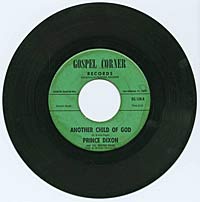Apr 22, 2008
 In my ongoing quest for music that can enact positive social change, I came across the Black Gospel Restoration Project, a project spearheaded by Robert Darden, associate professor of journalism at Baylor University. Following is a [...]
In my ongoing quest for music that can enact positive social change, I came across the Black Gospel Restoration Project, a project spearheaded by Robert Darden, associate professor of journalism at Baylor University. Following is a [...]
Read the Full Article

Already a subscriber? Login